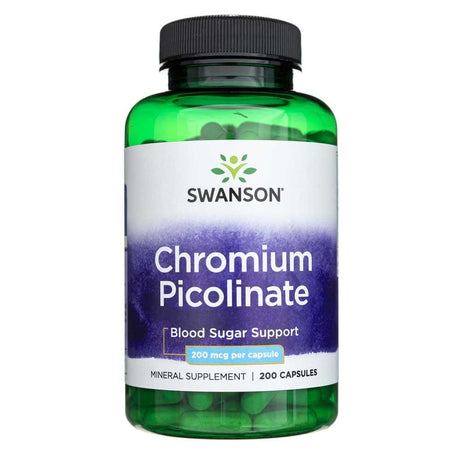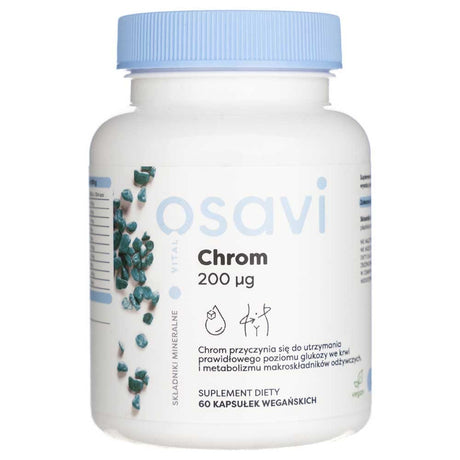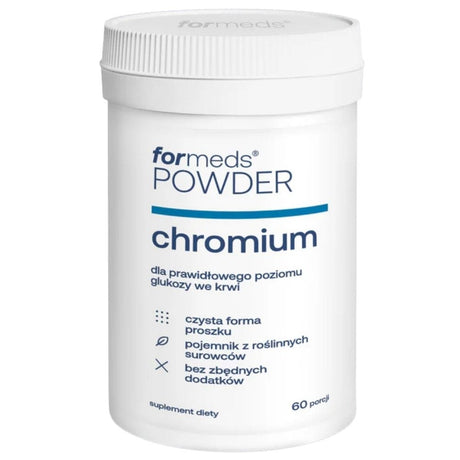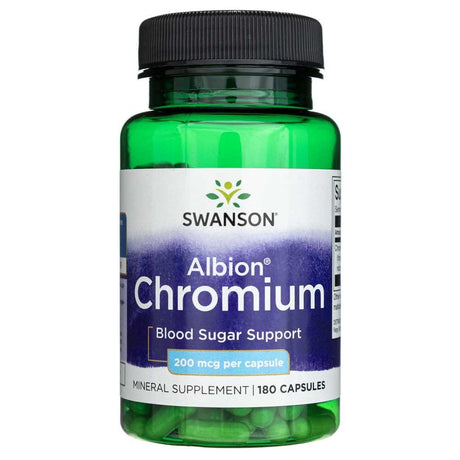Ostrovit
Ostrovit Chromium 200 - 200 Tablets
Sale price €4.04 Regular price €4.49Unit price€0.02 eachNow Foods
Now Foods Chromium Picolinate 200 mcg - 100 Veg Capsules
Regular price €5.39Unit price€0.05 eachNow Foods
Now Foods Chromium Picolinate 200 mcg - 250 Veg Capsules
Regular price €11.79Unit price€0.05 eachPurelab Marek Skoczylas
Skoczylas Cholesterol - 60 Capsules
Regular price €9.49Unit price€0.16 eachActivlab
Activlab Pharma Chromium Organic 200 mg - 60 Tablets
Regular price €4.39Unit price€0.07 eachInvex Remedies
Invex Remedies Zn+Mn+Cr - 150 ml
Sale price €10.02 Regular price €11.79Unit price€6.68 /100ml
Chromium: An Essential Trace Element for Optimal Health
Chromium is a crucial trace element that plays a vital role in maintaining proper bodily functions. This mineral is particularly important for improving insulin sensitivity and regulating protein, carbohydrate, and lipid metabolism. Despite its significance, many people's daily diets often fall short of providing adequate chromium levels, potentially leading to various health issues. In this comprehensive guide, we'll delve into the properties, effects, and benefits of chromium, as well as explore its recommended dosage.
Understanding Chromium's Unique Properties
Chromium exists in two primary forms: Cr(III) and Cr(VI). The trivalent form, Cr(III), is the most beneficial and safe for human consumption. It easily penetrates cell membranes and distributes rapidly throughout the body without posing significant health risks. However, chromium's bioavailability is relatively low due to poor absorption in the gastrointestinal tract. In fact, only about 2.5% of consumed chromium is typically absorbed by the intestines.
While chromium naturally occurs in various food sources, including yeast, mushrooms, nuts, asparagus, and whole grain products, these dietary sources often provide only trace amounts. The absorption of chromium can be enhanced by certain nutrients, such as vitamin C, niacin, and amino acids, which act as zinc chelating compounds.
The Powerful Effects of Chromium on the Body
Chromium's impact on human health is multifaceted and significant. This essential mineral serves as a component of important enzymes and stimulates their activity. Some of its key functions include:
- Stimulating pancreatic activity
- Stabilizing RNA structure
- Enhancing insulin effectiveness
- Influencing protein and lipid metabolism
Recent research has also highlighted chromium's potential cognitive benefits. Chromium supplementation has shown positive effects on cognitive function in individuals with Alzheimer's disease and may offer protection against other neurodegenerative conditions.
Chromium's Role in Weight Management
One of the most intriguing aspects of chromium is its potential impact on weight management. Studies have demonstrated that chromium plays a role in regulating appetite and food cravings. It has been shown to help reduce fat mass while simultaneously increasing lean muscle mass. Some research even suggests that chromium may benefit individuals struggling with compulsive overeating disorders.
However, it's important to note that the body's response to chromium can vary based on numerous factors, and its precise mechanism of action is not yet fully understood. For optimal results, chromium supplementation should be part of a comprehensive weight management plan that includes a balanced diet and regular physical activity.
Recognizing Chromium Deficiency
Chromium deficiency can manifest through various symptoms, including:
- Numbness and tingling in extremities
- Moderate to severe headaches
- Chronic fatigue and apathy
- Irritability and mood swings
- Movement coordination disorders
- Increased risk of cardiovascular disease and type 2 diabetes
Several factors can contribute to chromium deficiency, with dietary choices being a primary culprit. Consuming foods high in simple sugars, fats, or highly processed ingredients can impair chromium absorption and utilization. It's worth noting that chromium retention tends to decrease with age, potentially increasing the risk of deficiency-related health issues in older adults.
Recommended Chromium Dosage
Chromium supplements are available in various forms, from single-ingredient products to complex multi-vitamin formulations. The body's demand for chromium typically increases during periods of stress, fatigue, or nutritional deficiency. This natural response mobilizes chromium reserves and increases the excretion of the element, a phenomenon often observed in individuals under high pressure or engaged in intense physical activities.
The recommended daily intake of chromium varies by age and gender:
- Adult women (up to age 50): 25 mcg/day
- Adult men (up to age 50): 35 mcg/day
- Women over 50: 20 mcg/day
- Men over 50: 30 mcg/day
These recommended doses help protect against deficiencies and support optimal bodily functions. However, individual needs may vary, and it's always advisable to consult with a healthcare professional before starting any new supplement regimen.
Conclusion
Chromium is an essential trace element that plays a crucial role in various bodily functions, from metabolism regulation to potential cognitive benefits. While it's present in some foods, many individuals may benefit from chromium supplementation to ensure adequate intake. By understanding the properties, effects, and recommended dosage of chromium, you can make informed decisions about incorporating this vital mineral into your health and wellness routine.
For high-quality chromium supplements and expert advice, explore our chromium collection at Medpak. Our carefully curated selection ensures you have access to the best chromium products to support your health and wellness goals.







































